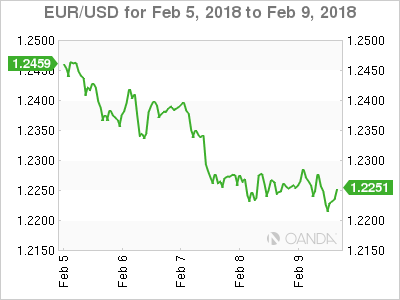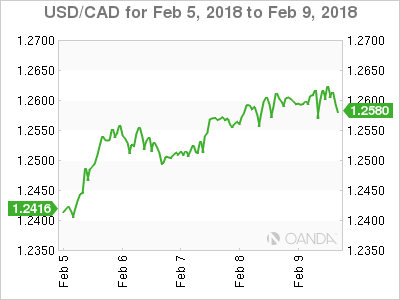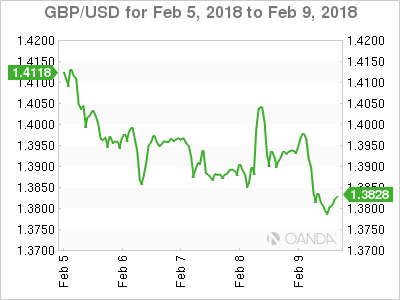BoE Signals Higher Interest Rates in the UK
The US dollar had its strongest week against major currency pairs in twelve months. Even as the United States is suffering a bout of political uncertainty the dollar became a safe haven as stocks and bonds saw massive moves this week. The signing of a federal budget by US President Donald Trump boosted the dollar ahead of the release of retail sales and inflation data next week. Central banks are moving away from record low interest rates around the globe.
- UK inflation expected at 2.9 percent
- US inflation potential rise has markets worried
- EU Brexit negotiator warns UK about transition risks

The EUR/USD lost 1.77 percent in the last five trading days. The single currency is trading at 1.2235 after heavy losses were registered by European equities to follow in line with the drop in American markets. The rise in wages in the latest U.S. non farm payrolls (NFP) report triggered a surge of the US dollar as investors are buying the currency as higher rates are in the horizon. Higher inflation is expected and will be one of the economic indicators under review this week. The US Bureau of Labor Statistics will publish the Consumer Price Index (CPI) on Tuesday, February 13 at 8:30 am EST. Core inflation is expected to have gained 0.2 percent in January with anything above could drive the US currency even higher.
European politics have reached some stability with the German coalition now in place but with the upcoming Italian elections in March the boat is sure to rock. Economic fundamentals have been strong in the eurozone with Germany leading the way as usual. The gap between the U.S. Federal Reserve and the European Central Bank (ECB) is closing with regarding monetary policy. The ECB is expected to end its QE program and could even lift interest rates later this year. The week will bring minor indicator releases in Europe with the German central bank chief Jens Weidmann speaking in Frankfurt on Wednesday, February 14 at 3:00 am EST. Earlier that day the GDP figures for Germany will be released with a 0.6 percent growth expected.
The market will be following US releases more closely after a strong week for the USD. Producer Price Index data will be released on February 15 at 8:30 am EST with a forecasted gain of 0.4 percent after the prices of goods fell last month.
Data released on Friday by the CFTC showed short positions of the US dollar shrank for the first time in six weeks signalling a change in investor sentiment towards the greenback.

The USD/CAD gained 1.52 percent in the last five days. The currency pair is trading at 1.2613 after the start of Monday trading at 1.2416. The stock market sell off has seen a growing appetite for US dollars as well as the end of some short USD positions. Canadian data was few and far between and it overall did not help the loonie. The Trade balance grew from 2.7 billion last month to 3.2 as imports grew by 1.5 percent in December, while export only did so by 0.6 percent. Canadian employment data was released on Friday and did not paint a pretty picture. Canada lost 88,000 positions well below expectations of a 10,000 gain in January. There was a slowdown anticipated after two back to back 70,000 plus gains, but the drop surprised even the more pessimistic analysts. The fact that most of the losses came in part time positions took some of the sting from the report and could be explained in part by the rise of minimum wages in Ontario.
Next week will be quiet in the Canadian economic calendar with the relatively new ADP non farm report due out on Thursday, February 15 at 8:30 am EST. and Foreign purchases of securities on Friday, February 16 at 8:30 am EST.

The GBP/USD lost 2.17 percent this week. The currency pair is trading at 1.3814 despite a hawkish Bank of England (BoE) singling a rate hike sooner rather than later. The biggest downwards pressure comes from comments by the EU Brexit negotiator Michel Barnier said Brussels as disagreements between the UK and the European Union remain. The words: "A transition is not a given", was a shock after the Brexit divorce appeared to be headed to a more amicable end. The fragile situation of the conservative government after their narrow triumph in the snap elections they themselves triggered has left them in a position of weakness at this stage of the negotiation.
The Bank of England (BoE) hosted its first super Thursday of the year on February 8. The central bank was openly hawkish about inflation and its willingness to hike sooner than later. The BoE could move interact rates higher as soon as May. The release of the Consumer Price Index on Tuesday, February 13 at 4:30 am could validate the strong messaging from the BoE if inflation stay above the 2 percent target.
Market events to watch this week:
Tuesday, February 13
- 4:30am GBP CPI y/y
- 9:00pm NZD Inflation Expectations q/q
Wednesday, February 14
- 8:30am USD CPI m/m
- 8:30am USD Core CPI m/m
- 8:30am USD Core Retail Sales m/m
- 8:30am USD Retail Sales m/m
- 10:30am USD Crude Oil Inventories
- 7:30pm AUD Employment Change
Thursday, February 15
- 8:30am USD PPI m/m
Friday, February 16
- 4:30am GBP Retail Sales m/m
- 8:30am USD Building Permits
*All times EDT
